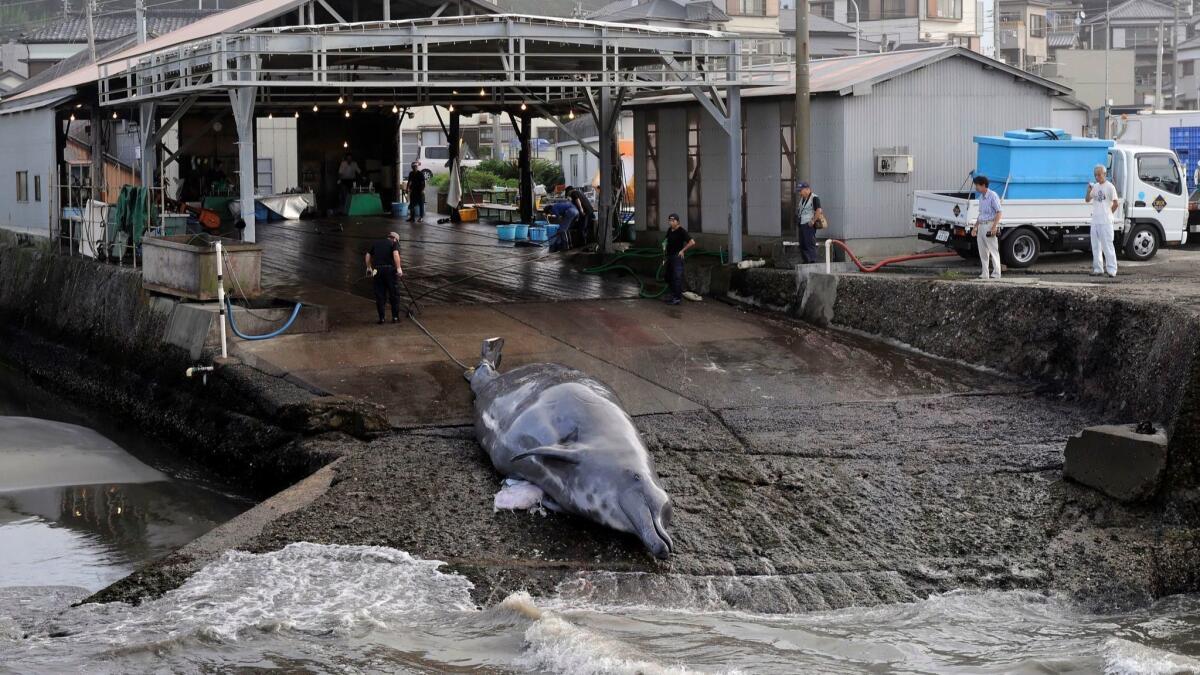Editorial: Japan should join the overwhelming majority of the world and stop whaling altogether

- Share via
Gone are the days when the great whales were hunted across the globe. A worldwide moratorium on commercial whaling that went into effect 33 years ago has mostly put an end to the practice, reviving the numbers and prospects of the majestic sea creatures — although some whale species are still considered threatened or endangered.
But among the more than 80 nations that belong to the International Whaling Commission and have signed on to its ban on commercial whaling, Japan has always been a renegade member. Its whalers continue to hunt and kill hundreds of whales each year under an exemption for “scientific research,” which conservationists consider a ridiculous sham. Then they sell the meat from the animals. Early last year Japan killed 333 minke whales —122 of which were pregnant. (Whales are slow to mature and they reproduce in small numbers, so the demise of a pregnant whale is a double blow to the population.)
Then, last week, Japan went a big step farther, announcing that it would leave the International Whaling Commission altogether and resume commercial whaling starting next July. Japan said it would stop the so-called research whaling in the Antarctic (which is good news for whales there). But the start-up of commercial whaling in its coastal waters in the North Pacific is an outrageous flouting of a long-established and still necessary global effort to preserve whale species and help them thrive.
The International Whaling Commission’s moratorium extends to coastal waters. Japan says it no longer wants to participate. But that decision makes Japan, essentially, a rogue whaling nation in the view of animal welfare organizations.
Enter the Fray: First takes on the news of the minute from L.A. Times Opinion »
Japanese whalers are likely to find mostly minke whales in Japanese coastal waters, and although their populations are healthy off Antarctica, they are more threatened off the coast of Japan. Conservationists and the International Whaling Commission consider all these species of large whales to be living under unstable conditions. Even if their numbers are not in immediate danger, they’re facing new environmental challenges. Whales are threatened not just by hunters, but also by climate change, pollution and toxic runoff and ships that strike them.
Japan should reassess its decision, stay in the commission and give up whaling. There is no reason for to continue a practice that is cruel — the whales, often, don’t die instantly — and depletes the stock. The days are past when Japan needed whale meat to feed its own people. Eating whale meat in Japan is a dying custom. It’s past time for the Japanese to join the overwhelming majority of the world and put the practice of whale hunting to rest, once and for all.
Follow the Opinion section on Twitter @latimesopinion or Facebook
A cure for the common opinion
Get thought-provoking perspectives with our weekly newsletter.
You may occasionally receive promotional content from the Los Angeles Times.






